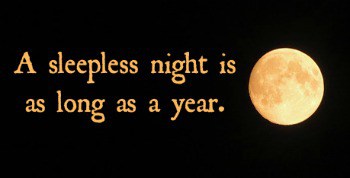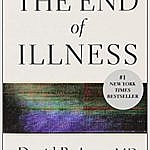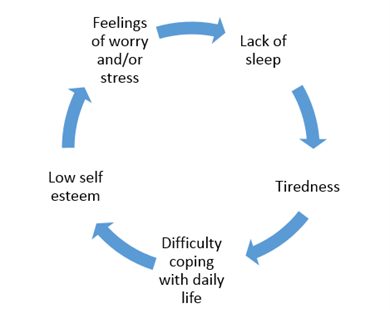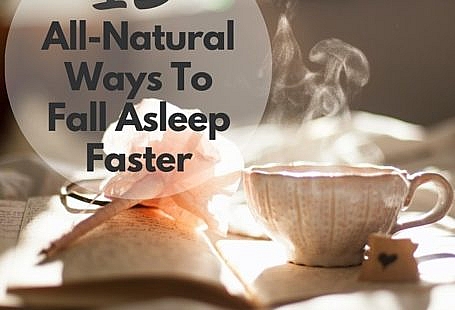What causes insomnia? When you figure out why you can’t sleep, you’re one step closer to curing your insomnia. Here are the most common causes of insomnia, plus tips for getting a good night’s sleep. For me, the biggest cause of insomnia when my brain just doesn’t turn off. This is more of a psychological condition than a medical one – but some health issues can cause insomnia.
Insomnia is when you can’t fall asleep or stay asleep. Symptoms of insomnia include sleep difficulties, chronic sleeplessness, and eventually sleep deprivation – which can affect your overall health. Sometimes insomnia is caused by a current life situation, such as stress or an injury. Other times, we have no idea what’s causing our insomnia – which is frustrating!
What Causes Insomnia?
Of all the sleep disorders, insomnia is the most commonly reported one. About 30% of adults have symptoms of insomnia. Less than 10% of adults have chronic insomnia. Insomnia is more common among elderly people (because of lower melatonin levels as we age) and women (I still need to research why women experience insomnia more than men – if you have any ideas, please comment below!).
Medical Causes of Insomnia
If you regularly have trouble sleeping, you might have an underlying medical issue or sleep disorder that is affecting your ability to fall and stay asleep. It’s possible that a simple sleep solution can be found, such as a sleep right pillow or avoiding bright light when you’re winding down before bed. If you have a serious health condition – or you suspect something medical is causing insomnia – then you should talk to a doctor. Don’t just accept poor sleep or chronic insomnia as a way of life.
Examples of medical conditions that can cause insomnia are:
- Nasal/sinus allergies
- Gastrointestinal problems
- Neurological conditions such as Parkinson’s disease
- Endocrine problems such as hyperthyroidism
- Arthritis
- Asthma
- Chronic pain
- Low back pain
Some prescription or over-the-counter medications for colds and nasal allergies, high blood pressure, heart disease, thyroid disease, birth control, asthma, and depression can also cause insomnia. Also, an underlying sleep disorder might cause insomnia. For example, restless legs syndrome (a neurological condition in which you have an uncomfortable sensation of needing to move your legs often) can be a cause of insomnia.
The best cure for medical causes of insomnia is to identify what health issue is preventing you from falling or staying asleep. You might also learn about the best herbal sleep supplements, which can help you sleep naturally.
Emotional Health Issues That Cause Insomnia
The ironic thing about an emotional health issue such as depression is that a primary symptom is low energy, yet it also causes sleeplessness. Psychological struggles and problems can make it hard to sleep, and insomnia itself changes how we feel about our lives and ourselves. Studies also show that insomnia can trigger or worsen depression.
Is depression the cause of your insomnia – and how do you know you’re depressed? The symptoms of depression include low energy, loss of interest or motivation, and feelings of sadness or hopelessness. Those are also the symptoms of insomnia – and one issue can make the other worse!
Curing this type of insomnia might involve a doctor or counselor’s help. If you think depression or another emotional health issue is causing insomnia for you, talk to your doctor about ways to get back on track. Or, you might think about how your spiritual life is affecting your thoughts and emotions. Are you connected to God, or something that feels higher and more powerful than yourself? A spiritual connection can help you cope with all sorts of issues in life, big and little.
If you’re taking prescription medication for sleep or anti-depressants but it’s not helping, read 10 Natural Sleep Remedies to Help You Fall Asleep Fast.
Anxiety
At the beginning of this article, I mentioned that a cause of insomnia for me is not being able to turn my brain off. This is actually a problem of long ago for me – I used to lie awake for hours, worried about what tomorrow will bring. It’s normal to occasionally deal with sleeplessness because you’re worried or nervous about something. But if your anxiety or nervousness is interfering with your sleep on a regular basis, then anxiety might be causing insomnia for you.
Symptoms of anxiety that lead to insomnia include tension, getting caught up in thoughts about past events, and excessive worrying about future events. That caused insomnia for me! If you feel overwhelmed by responsibilities or often feel wound up or overstimulated, then you’ll have problems sleeping.
Lifestyle as a Cause of Insomnia
How are you experiencing life – are you living with peace and passion? Further, are you getting enough exercise, being hugged enough, connecting with God enough, and finding a healthy balance between your job and your personal life?
If you’re watching TV or your computer late into the night, using drugs or alcohol to cope with problems, or filling the ache in your soul with meaningless activities and possessions, you may be unwittingly causing insomnia. Maybe you’re working too much, or caring to much what other people think. Other insomnia causes include shift work or lots of travel.
Food and Insomnia
How, what, and when you eat can cause insomnia. Spicy foods can cause heartburn and interfere with your sleep. When I eat a heavy meal after 8 pm or drink too much, I’m staring into the abyss of a long, sleepless night! You may think that alcohol helps you sleep – and it is a sedative. It helps you fall asleep fast, but it interferes with your sleep later in the night.
Alcohol isn’t the only beverage that can cause insomnia and sleeplessness – so can hot chocolate, lattes, soda pop, or even certain types of black tea. A National Sleep Foundation poll found that people who drank four or more cups or cans of caffeinated drinks a day were more likely to experience at least one symptom of insomnia at least a few nights each week, as compared to people who drank none or one cup or can daily. Caffeine can stay in your system for as long as eight hours, so it can be a cause of insomnia.
Do you smoke? Nicotine is a stimulant and can cause insomnia. Smoking cigarettes or tobacco products close to bedtime can make it hard to fall asleep and to sleep well through the night.
Those are the five most common causes of insomnia. I rarely struggle with insomnia because I get up at 5:15 am every morning – and by 9 pm, I’m so ready for bed! One of the best ways to deal with insomnia and get good sleep is to establish a regular, health sleep and wake schedule.
When you have problems sleeping – or insomnia – how do you cope with it?
Related Reading: 10 Gifts for Insomniacs and People Who Can’t Sleep.
Sources: The American Academy of Sleep Medicine’s Chronic Insomnia Can Lead to Anxiety and Depression and the National Sleep Foundation’s What Causes Insomnia?





